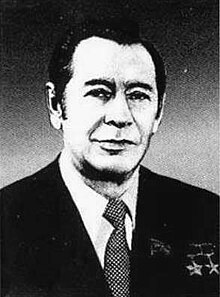Pyotr Masherov | |
|---|---|
Пётр Машэраў | |
 Masherov as shown on a 1996 stamp of Belarus | |
| First Secretary of the Communist Party of Byelorussia | |
| In office 30 March 1965 – 4 October 1980 | |
| Preceded by | Kirill Mazurov |
| Succeeded by | Tikhon Kiselyov |
| Candidate member of the 23rd, 24th, 25th Politburo | |
| In office 8 April 1966 – 4 October 1980 | |
| Personal details | |
| Born | Piatro Mironavič Mašera 26 February 1919 Shirki, Socialist Soviet Republic of Lithuania and Belorussia, Russian Socialist Federative Soviet Republic (now Belarus) |
| Died | 4 October 1980 (aged 61) Smoleviči, Byelorussian SSR, Soviet Union (now Belarus) |
| Political party | Communist Party of the Soviet Union (1943–1980) |
| Other political affiliations | Communist Party of Byelorussia |
| Spouse | Polina Andreyevna |
| Relations | 3 sisters 1 brother |
| Children | Natalia, Yelena |
| Profession | Teacher, civil servant |
| Military service | |
| Allegiance | Soviet Union |
| Branch/service | |
| Years of service | 1941–1945 |
| Rank | Major general |
| Battles/wars | |
Pyotr Mironovich Masherov[a] (né Mashero[b]; 26 February [O.S. 13 February] 1919 – 4 October 1980) was a Soviet partisan, statesman, and one of the leaders of the Belarusian resistance during World War II who governed the Byelorussian Soviet Socialist Republic as First Secretary of the Communist Party of Byelorussia from 1965 until his death in 1980. Under Masherov's rule, Belarus was transformed from an agrarian, undeveloped nation which had not yet recovered from the Second World War into an industrial powerhouse; Minsk, the capital and largest city of Belarus, became one of the fastest-growing cities on the planet.[1] Masherov ruled until his sudden death in 1980, after his vehicle was hit by a potato truck.
Born to a peasant family in what is today the Vitebsk Region during the early stages of the Russian Civil War, Masherov was a teacher in mathematics and physics in his youth.[2] Following his father's arrest and death during the Great Purge,[3] Masherov joined the Red Army following the beginning of Operation Barbarossa, and rose to the rank of major general.[2] With the end of the Second World War, Masherov turned to politics; becoming First Secretary of the Brest Regional Committee in 1955 and First Secretary of the Communist Party of Byelorussia ten years later.[4]
Masherov was known for his down-to-earth demeanour and for his humility,[4] separating him from much of the rest of the upper echelons of Soviet government during the Era of Stagnation, a time period in which corruption and resistance to reform ran rampant. Masherov was closely affiliated with reformists in the Soviet Union such as Alexei Kosygin,[4] and was prior to his death considered a possible successor to Yuri Andropov in the case that he were to succeed Leonid Brezhnev as General Secretary of the Communist Party of the Soviet Union.[5] Masherov remains very popular in Belarus to this day, owing to the rapid growth of the economy under his rule.[1]
Cite error: There are <ref group=lower-alpha> tags or {{efn}} templates on this page, but the references will not show without a {{reflist|group=lower-alpha}} template or {{notelist}} template (see the help page).
- ^ a b "95th Birth Anniversary of Pyotr Masherov". Vestnik Kavkaza. 15 February 2013. Archived from the original on 9 October 2021. Retrieved 19 July 2021.
- ^ a b Shutskiy, V. P. On the Origins of the Partisan Movement. pp. 96–100.
- ^ "Victims of Political Terror in the USSR". 13 December 2016. Retrieved 18 July 2021.
- ^ a b c "He could have created a different USSR. The life and death of Pyotr Masherov". Arguments and Facts in Belarus. 26 February 2020. Retrieved 19 July 2021.
- ^ Cloud, Marcus (18 March 2020). "Petr Masherov: the mystery of the death of the main applicant for a post of the head of the Soviet Union". Law & Lawyer Journals. Retrieved 19 July 2021.